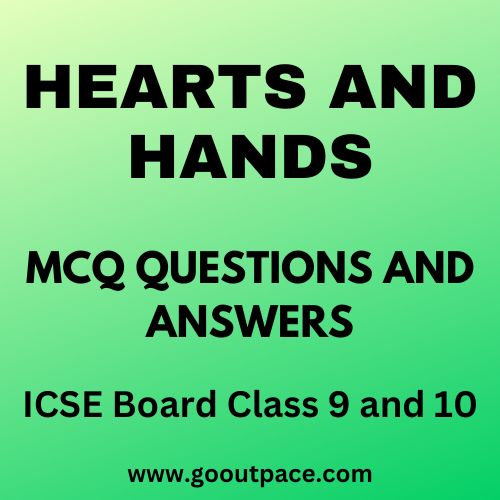You will go through MCQ Questions And Answers Of ICSE Board Class 9 and 10 HEARTS AND HANDS. Understanding a text’s entirety is very important for a learner to score better on the exam. We made Efforts to ensure thorough and proper MCQ Questions And Answers Of ICSEBoard Class 9 and 10 HEARTS AND HANDS.

1. Who is the writer of the story?
- Robert Southey
- Roald Dahl
- Ruskin Bond
- O. Henry
2. When was the story first published?
- 1910
- 1958
- 1922
- 1902
3. What is the meaning of the term ‘rouse’ in the text?
- To be careful
- To cause excitement
- To calm down
- To procrastinate
4. How has the author described Miss Fairchild?
- Pretty, mid-aged, and rude
- Pretty, rich, and mean
- Mid-aged and elegant
- Pretty, young, and elegant
5. “I’ll ask you to excuse the other hand; it’s otherwise engaged just at present.”- What does the speaker mean by his hand being engaged?
- The speaker’s left hand was handcuffed to the other man
- His right hand was handcuffed to the other man
- His hands were handcuffed to two other men
- The speaker had just gotten engaged
6. What is the meaning of the “shining bracelet” in the text?
- Handcuff
- Ring
- Rope
- Gold bracelet
7. What was Miss Fairchild’s reaction when she saw that Mr Easton was handcuffed?
- She felt that he had done something wrong
- She felt that he was a marshal
- She was angry and embarrassed seeing her friend in such a situation
- She could not comprehend the whole situation
8. Why was Mr Easton actually handcuffed?
- Both men were going to the prison for money laundering
- He was being taken to the prison by the other man who was a marshal
- He was a marshal and was taking the other man to Leavenworth prison
- Both of the men were handcuffed accidentally
9. Why was the convict going to prison for?
- Counterfeiting
- Fraud
- Attempt to murder
- Assault
10. What was Mr Easton doing before becoming a marshal?
- A journalist
- A writer
- A doctor
- An ambassador
11. “Mamma and I spent the summer in Denver”- Who is ‘I’ in the line?
- Mr Easton
- Miss Fairchild
- The man handcuffed to Mr Easton
- Miss Fairchild’s niece
12. Who was the marshal?
- Mr Easton
- Both Mr Easton and the glum-faced man
- The glum-faced man
- None of the two men
13. Who first found out that Mr Easton was not really the marshal?
- The ticket collector
- A man sitting next to Miss Fairchild
- Miss Fairchild
- One of the two passengers sitting nearby
14. Which of the following messages do you learn from the story?
- One should not lie to friends
- Friend in need is a friend indeed
- Things should not be judged by their outward appearance
- Love for humanity is very important
15. Why did the real marshal decide to conceal the truth from Miss Fairchild?
- Mr Easton and Miss Fairchild were old acquaintances, and hence he felt pity on Easton
- Mr Easton was poor and thus, the marshal felt pity on him
- The marshal had orders to conceal the truth from any outsider
- Easton started lying, and the marshal just decided to play along
16. “I’m half dead for a pipe.”- Find the figure of speech.
- Alliteration
- Litotes
- Hyperbole
- Pun
17. “The younger man roused himself sharply at the sound of her voice”- Find the figure of speech.
- Personification
- Imagery
- Metaphor
- Transferred epithet
18. “My butterfly days are over, I fear.”- Who is the speaker?
- One of the two passengers
- Miss Fairchild
- Mr Easton
- Miss Fairchild’s father
19. What surprised Miss Fairchild about the two men?
- Miss Fairchild felt that he knew both the men
- They were handcuffed to each other
- They were fighting with each other
- They were having a conversation that interested Miss Fairchild
20. What is the meaning of the word ‘countenance’ in the story?
- An arrival of a large number of people or things
- Warm weather
- Empty
- A person’s face or facial expression
Answers:
- D) O. Henry.
- D) 1902.
- B) To cause excitement.
- D) Pretty, young, and elegant.
- B) His right hand was handcuffed to the other man.
- A) Handcuff.
- A) She felt that he had done something wrong.
- B) He was being taken to the prison by the other man who was a marshal
- A) Counterfeiting.
- D) An ambassador.
- B) Miss Fairchild.
- C) The glum-faced man.
- D) One of the two passengers sitting nearby.
- C) Things should not be judged by their outward appearance.
- A) Mr Easton and Miss Fairchild were old acquaintances, and hence he felt pity on Easton.
- C) Hyperbole.
- A) Personification.
- C) Mr Easton.
- B) They were handcuffed to each other.
- D) A person’s face or facial expression.

